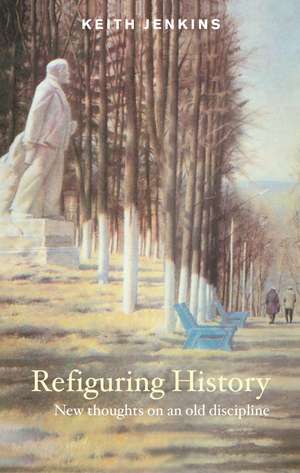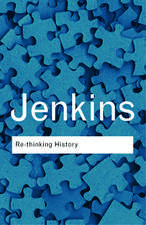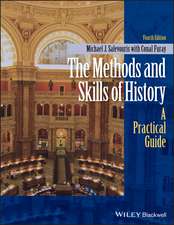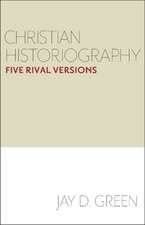Refiguring History: New Thoughts On an Old Discipline
Autor Keith Jenkinsen Limba Engleză Hardback – 28 noi 2002
Jenkins reassesses conventional history in a bold fashion. His committed and radical study presents new ways of 'thinking history', a new methodology and philosophy and their impact on historical practice.
This volume is written for students and teachers of history, illuminating and changing the core of their discipline.
| Toate formatele și edițiile | Preț | Express |
|---|---|---|
| Paperback (1) | 342.92 lei 6-8 săpt. | |
| Taylor & Francis – 21 noi 2002 | 342.92 lei 6-8 săpt. | |
| Hardback (1) | 992.38 lei 6-8 săpt. | |
| Taylor & Francis – 28 noi 2002 | 992.38 lei 6-8 săpt. |
Preț: 992.38 lei
Preț vechi: 1210.21 lei
-18% Nou
Puncte Express: 1489
Preț estimativ în valută:
189.95€ • 206.40$ • 159.66£
189.95€ • 206.40$ • 159.66£
Carte tipărită la comandă
Livrare economică 22 aprilie-06 mai
Preluare comenzi: 021 569.72.76
Specificații
ISBN-13: 9780415244107
ISBN-10: 0415244102
Pagini: 96
Dimensiuni: 138 x 216 x 10 mm
Greutate: 0.23 kg
Ediția:1
Editura: Taylor & Francis
Colecția Routledge
Locul publicării:Oxford, United Kingdom
ISBN-10: 0415244102
Pagini: 96
Dimensiuni: 138 x 216 x 10 mm
Greutate: 0.23 kg
Ediția:1
Editura: Taylor & Francis
Colecția Routledge
Locul publicării:Oxford, United Kingdom
Public țintă
Postgraduate and UndergraduateRecenzii
'Refiguring History does just that with recent debates over the nature and aims of historical knowledge. In the process, he not only clarifies the differences between modernist and postmodernist conceptions of "the past," he also assesses their relative value for life. This is a small masterpiece which moves the debate over "learning from history" to a new and more fascinating level of engagement.' - Hayden White, Stanford University
'Jenkins is himself responsible to no small degree for placing radical reflection about the nature of academic history on the agenda. This at times outrageously provocative book, full of colour and vigour, will stimulate a keen appetite for historical theory and philosophy among students, and cannot fail to liven up seminar discussion. It therefore fully lives up to the expectations the author has come to generate.' - Rethinking History Journal
'The general thrust of his argument and the thinkers invoked - Derrida, White, Ankersmit - may be broadly familiar, but there are many corruscating formulations and innovative twists and an engaging verve to the prose'. - Journal of Contemporary History, Vol. 40, No. 1
'Refiguring History does just that with recent debates over the nature and aims of historical knowledge. In the process, he not only clarifies the differences between modernist and postmodernist conceptions of "the past," he also assesses their relative value for life. This is a small masterpiece which moves the debate over "learning from history" to a new and more fascinating level of engagement.' - Hayden White, Stanford University
'Jenkins is himself responsible to no small degree for placing radical reflection about the nature of academic history on the agenda. This at times outrageously provocative book, full of colour and vigour, will stimulate a keen appetite for historical theory and philosophy among students, and cannot fail to liven up seminar discussion. It therefore fully lives up to the expectations the author has come to generate.' - Rethinking History Journal
'Jenkins is himself responsible to no small degree for placing radical reflection about the nature of academic history on the agenda. This at times outrageously provocative book, full of colour and vigour, will stimulate a keen appetite for historical theory and philosophy among students, and cannot fail to liven up seminar discussion. It therefore fully lives up to the expectations the author has come to generate.' - Rethinking History Journal
'The general thrust of his argument and the thinkers invoked - Derrida, White, Ankersmit - may be broadly familiar, but there are many corruscating formulations and innovative twists and an engaging verve to the prose'. - Journal of Contemporary History, Vol. 40, No. 1
'Refiguring History does just that with recent debates over the nature and aims of historical knowledge. In the process, he not only clarifies the differences between modernist and postmodernist conceptions of "the past," he also assesses their relative value for life. This is a small masterpiece which moves the debate over "learning from history" to a new and more fascinating level of engagement.' - Hayden White, Stanford University
'Jenkins is himself responsible to no small degree for placing radical reflection about the nature of academic history on the agenda. This at times outrageously provocative book, full of colour and vigour, will stimulate a keen appetite for historical theory and philosophy among students, and cannot fail to liven up seminar discussion. It therefore fully lives up to the expectations the author has come to generate.' - Rethinking History Journal
Cuprins
Introduction 1 Opening time(s) 2 Last order(s) 3 Beginning again: on disobedient dispositions
Notă biografică
Keith Jenkins is Professor of Historical Theory at University College, Chichester. He is the author of Rethinking History (1991), On 'What is History?' (1995), The Postmodern History Reader (1997), and Why History? (1999).
Descriere
This engaging sequel to Rethinking History, argues for a re-figuration of historical study. At the core of this survey lies the realization that objective and disinterested histories as well as historical 'truth' are unachievable.












